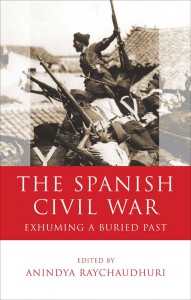Book Review: Exhuming a buried past
 This article appeared in the 35th issue of the newsletter of the International Brigade Memorial Trust and is reprinted here with the IBMT’s permission.
This article appeared in the 35th issue of the newsletter of the International Brigade Memorial Trust and is reprinted here with the IBMT’s permission.
This is a broad interdisciplinary collection, with contributions from the fields of history, literature, media, and visual culture, and there is much of interest to those researching both the Spanish Civil War and its enduring legacy.
For those with a particular interest in the International Brigades, there are two intriguing chapters. The first, by John D Mehta, is a delicate and personal enquiry into Gilbert Taylor, a Welshman who died in Spain in the spring of 1938. Mehta’s article is an example of detective work, revealing that some Brigaders left complicated personal and political lives behind them when they went to fight. The second is David Convery’s account of the testimony and memoirs of British and Irish prisoners of war incarcerated in a Francoist prison in Burgos. This chapter provides moving insights into the experiences of repression and resistance recalled by former inmates.
For those interested in the British literary response, Patricia Rae’s analysis of elegies to the war dead and Edward Quipp’s piece on the poetry of Auden both reveal the extent to which British understandings of Spain were conditioned by World War I, which functioned as a point of contrast and comparison for many Brigaders. Julián Casanova’s chapter on the murder and subsequent beatification of Spanish clerics is detailed and informative, but also powerfully written, reflecting the divisions at the heart of Spanish culture that persist to the present day.
The contributions are of a uniformly high quality, well-written and well-edited, and are exemplary in their clarity and concision. The chapters may even be too concise, in that most have a narrow focus on a single case study, episode or place, with little contextualising information to guide the more general reader, and many chapters assume some background knowledge.
The book succeeds in its aim to be interdisciplinary, but it does lack a really cohesive theme or direction. And the subject coverage is neither systematic nor accessible enough to function as a general guide or handbook. The introduction is snappily written and historically perceptive, but makes little thematic connection between the chapters. A conclusion could have helped to draw out the common themes and to dig deeper into the current state of memory work on Spain, but, nevertheless, this book showcases the best of that work very well.
Layla Renshaw is Principal Lecturer in Forensic Science at the School of Life Sciences of Kingston University, Surrey.












